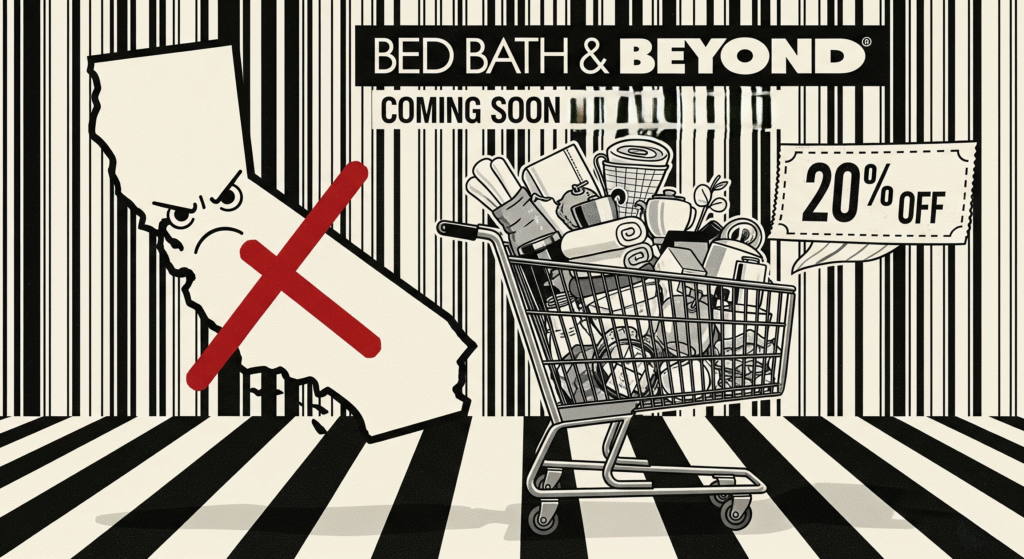By The Milk News Desk
California – August 21, 2025
The home goods giant that once dominated suburban strip malls with its iconic 20%-off coupons is back from the retail graveyard, but its resurrection comes with a twist that has the Golden State seeing red. Just weeks after opening its first comeback store in Nashville, Bed Bath & Beyond dropped a bombshell that sent shockwaves through both political and retail circles: California is off-limits.

The California Conundrum: A Retailer’s Reality Check?
Marcus Lemonis, the Executive Chairman of Bed Bath & Beyond, has been the most vocal proponent of this controversial stance. His reasoning is clear and direct: California, he argues, has created
“one of the most overregulated, expensive and risky environments for businesses in America.” He asserts that the state’s policies make it “harder to employ people, harder to keep doors open and harder to deliver value to customers.” For Lemonis, this isn’t about politics, but about the harsh realities of doing business in a state he views as actively hostile to retail growth.
This isn’t just corporate bluster. For many retailers, California represents a unique challenge. High minimum wages, stringent labor laws, complex environmental regulations, and elevated operating costs (including rent and utilities) can significantly erode profit margins. While California offers a massive consumer market, the cost of entry and sustained operation can be prohibitive, especially for companies attempting a turnaround after a major financial setback.
When Business Strategy Meets Political Theater
What makes this story fascinating isn’t just the decision itself, but how it illuminates a broader tension reshaping American retail. Lemonis didn’t just quietly skip California in his expansion plans—he made it a public spectacle, calling out the state’s “higher taxes, higher costs, higher regulations” while positioning his company as a victim of governmental overreach.
The response was swift and pointed. California Governor Gavin Newsom’s office fired back on social media with characteristic political snark: “After their bankruptcy and the closure of every location, like many Americans, we believed Bed Bath & Beyond had vanished. We wish them success in their quest to regain relevance as they prepare to launch a second store”.
But here’s where it gets interesting for retail strategists: Lemonis doubled down. Instead of backing away from the controversy, he engaged directly with Newsom on social media, suggesting the governor understood the frustration behind pro-business reforms. It’s a masterclass in using controversy as marketing—turning a business limitation into brand positioning
Beyond the Headlines: What This Means for the Retail Industry
Bed Bath & Beyond’s decision, and the ensuing public spat with Governor Gavin Newsom, is more than just a localized business story. It’s a microcosm of a larger, ongoing tension within the retail industry: the delicate balance between regulatory environments, operational costs, and market access. For retail industry professionals, this situation offers several critical insights:
1.The Shifting Value Proposition of Physical Stores: In an increasingly e-commerce-dominated world, every square foot of physical retail space must justify its existence. High operating costs in certain regions force retailers to be incredibly strategic about where they establish a brick-and-mortar presence. The California decision highlights a calculated risk assessment – is the potential market gain worth the regulatory and financial burden?
2.The Power of Public Statements: Lemonis’s direct and unapologetic critique of California’s business environment is a rare move for a retail executive. It signals a growing willingness among business leaders to publicly challenge what they perceive as unfavorable conditions. This could set a precedent for other companies to be more vocal about the challenges they face in specific markets.
3.The Regulatory Tightrope: States and municipalities are constantly balancing the desire to protect workers and the environment with the need to attract and retain businesses. California, often seen as a bellwether for progressive policies, is now facing direct pushback from a brand attempting to rebuild. This situation could prompt other states to re-evaluate their own regulatory frameworks to ensure they remain competitive for retail investment.
4.The Rise of Curated Retail Experiences: Bed Bath & Beyond’s comeback strategy includes opening
“curated, smaller format” stores and converting existing Kirkland’s fleet. This reflects a broader trend in retail towards more focused, experience-driven physical spaces, moving away from the sprawling big-box model. The California decision underscores that this strategic shift isn’t just about consumer preferences, but also about economic viability in diverse regulatory climates.
[ Written by Veteran Journalists and used web Sources with AI Assistant]
